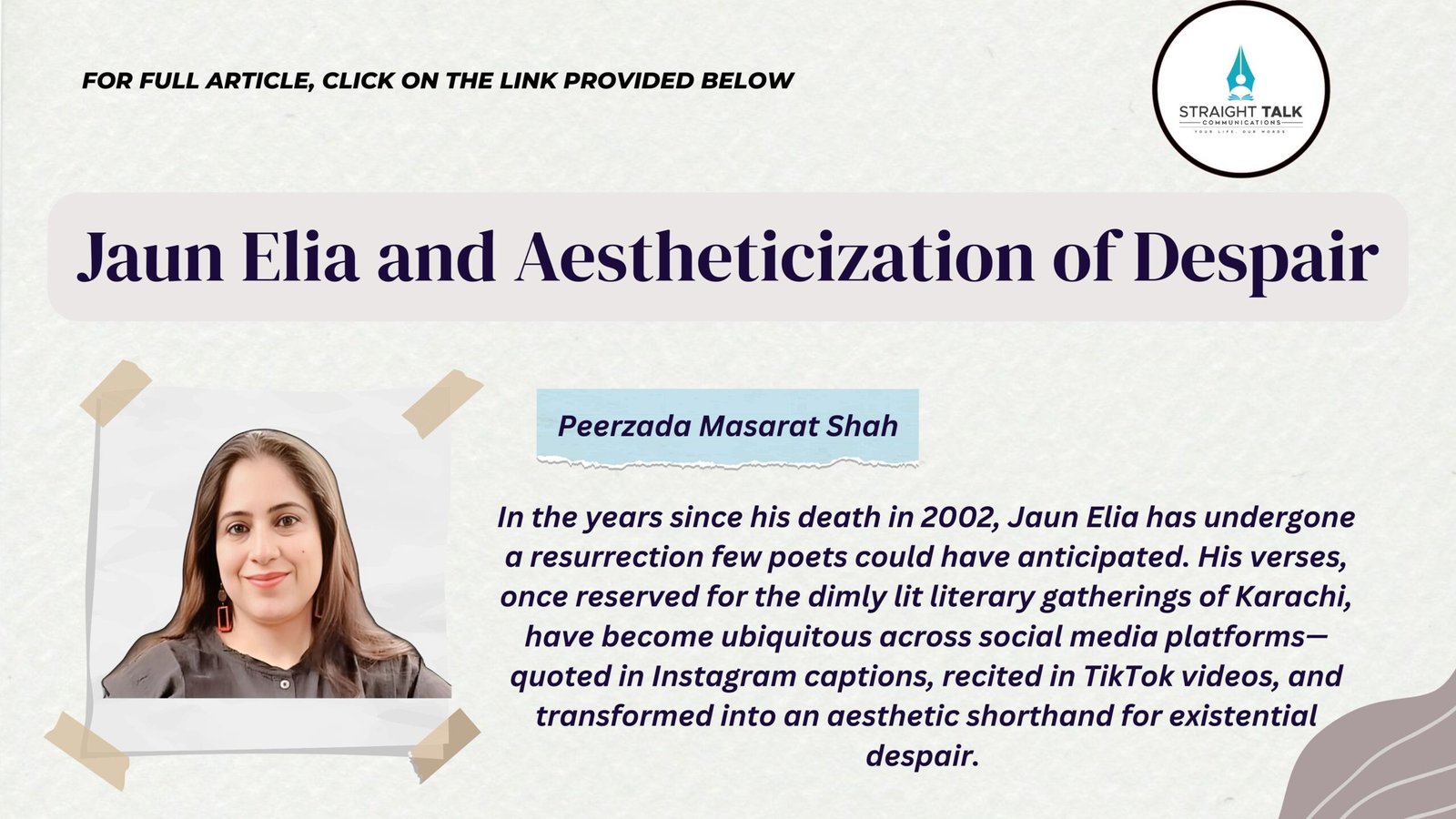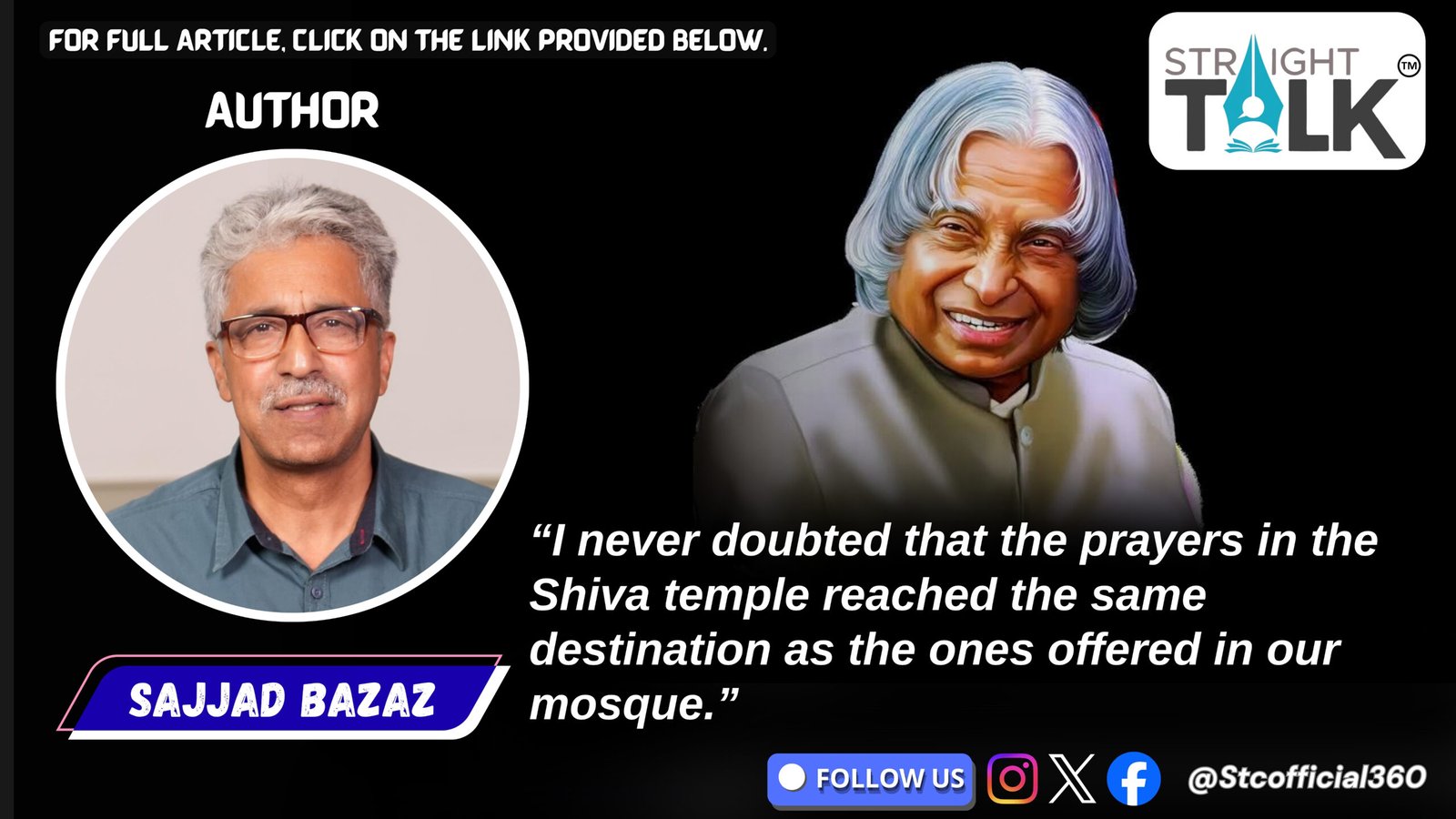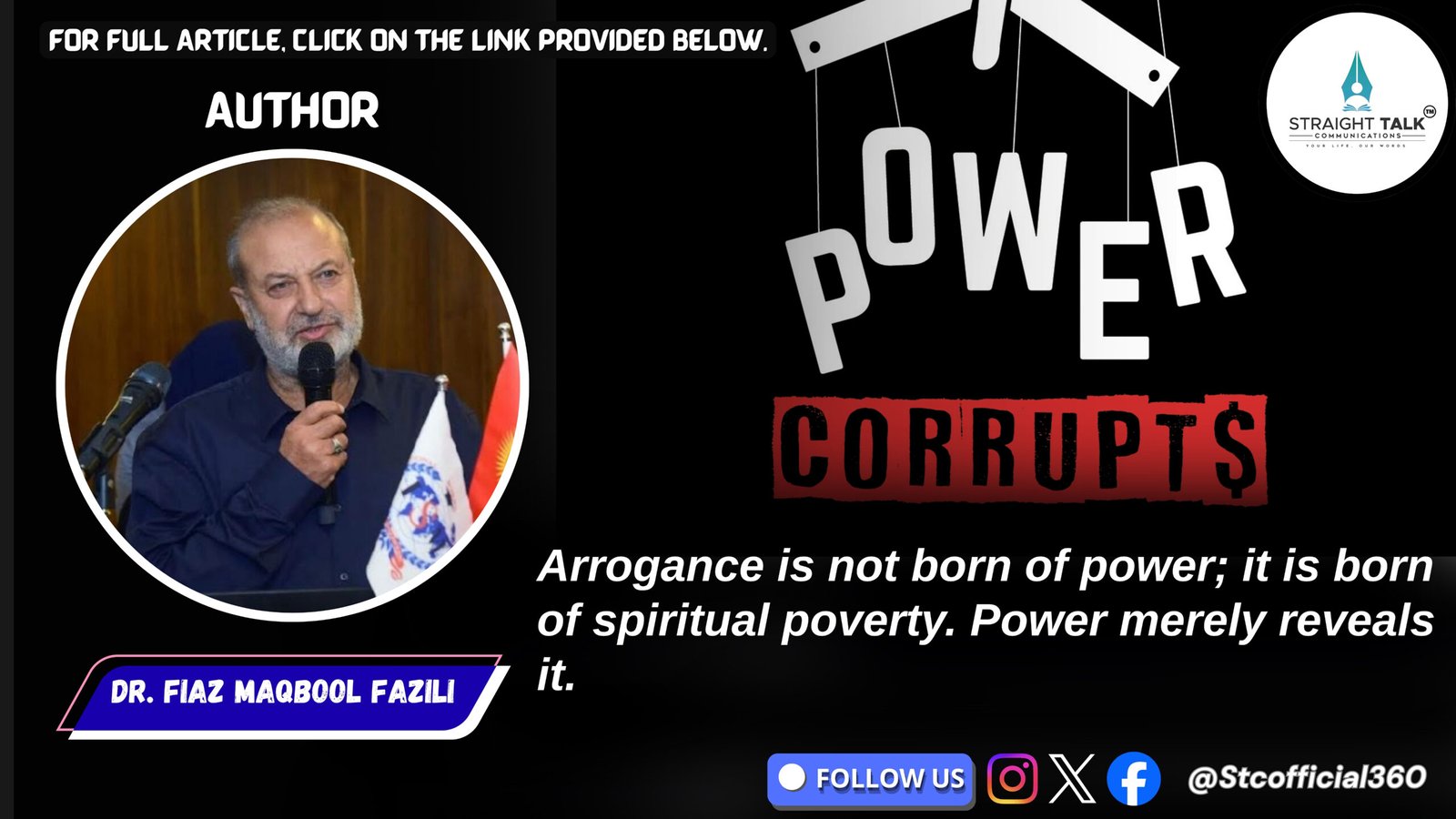Jaun Elia and Aestheticization of Despair

Peerzada Masarat Shah
In the years since his death in 2002, Jaun Elia has undergone a resurrection few poets could have anticipated. His verses, once reserved for the dimly lit literary gatherings of Karachi, have become ubiquitous across social media platforms—quoted in Instagram captions, recited in TikTok videos, and transformed into an aesthetic shorthand for existential despair. In an age that prefers its melancholy to be neatly packaged and consumable, Elia has become an unintentional patron saint of disillusionment. But as his poetry reaches an audience far removed from the literary salons of his time, one is forced to ask: Has Jaun Elia become merely a poster boy for performative sadness, or does his work still hold the literary weight it once carried?
Elia’s poetry was never meant to be a comfort. His verse is a place of ruin, an abyss one stares into rather than escapes. Unlike his contemporaries—Faiz Ahmed Faiz, Habib Jalib, and Ahmad Faraz—whose poetry carried the pulse of revolution and social consciousness, Elia was deeply personal, almost obsessively so. Faiz’s verses were banners of defiance, Jalib’s were weapons against tyranny, and even Faraz, with his romanticism, infused his work with an undercurrent of rebellion. Elia, however, wrote neither for the barricades nor for the dream of utopia. His poetry is a whispered lament, a resignation to a world irreversibly broken, where suffering is not a means to an end but an end in itself.
The Philosopher of Sorrow
There is a reason Elia’s poetry resonates so profoundly with the digital generation. His words are an unfiltered embrace of contradictions—he was a philosopher yet deeply emotional, an intellectual heavyweight yet stylistically raw, a linguist steeped in Persian and Arabic traditions yet strikingly modern in sentiment. Unlike Mirza Ghalib, whose ambiguity left room for interpretation, Elia’s despair is absolute. His famous couplet—
“Main bhi bohot ajeeb hoon, itna ajeeb hoon ke bas,
Khud ko tabaah kar liya, aur malaal bhi nahi”
(I am very strange, so strange that even I cannot explain,
I have destroyed myself, yet I do not even regret it)
—has become an existential mantra for the disenchanted, repurposed for the fleeting visuals of Instagram stories. Where Ghalib questioned the nature of suffering, Elia surrendered to it.
Yet, Jaun Elia was not merely a poet of sadness. His work carried immense intellectual depth, engaging with themes of Marxism, existentialism, and deep skepticism about both political and personal salvation. His poetry, though draped in despair, was not just an aesthetic indulgence but a reflection of a mind grappling with the absurdities of existence.
Social Media and the Oversimplification of Jaun Elia
But the rise of Jaun Elia in the digital age has come with a cost. Social media has reduced his poetry to bite-sized, digestible melancholy, stripping it of its historical and philosophical depth. His verses on heartbreak and suffering have been cherry-picked and repackaged as aesthetic mood pieces, making him appear as nothing more than an “emo” poet for the internet generation.
His complex thoughts on identity, existential dread, and societal decay are often overshadowed by his more melancholic verses that easily fit into a tweet or an Instagram caption. This oversimplification ignores the intellectual pursuits that shaped his poetry. Jaun Elia was not just a poet of sadness; he was a poet of disillusionment, a man who recognized that meaning itself was an illusion, and yet found beauty in articulating this despair.
“Rakhni hai ek shart ke ye zindagi guzar
Aansu bhi ho kam, hansi bhi kamal ho”
(I have set a condition for this life to pass,
Tears should be few, and laughter should be profound)
Criticism and Literary Scrutiny
Critics of Elia often point to his introspective style as a limitation, arguing that he remained fixated on his own suffering rather than engaging with the collective struggles of his time. Compared to Faiz, who envisioned poetry as an instrument of change, or Jalib, whose words carried the raw force of protest, Elia’s verses can feel almost self-indulgent. His poetry does not call for revolution; it does not even call for hope. It is not a call at all—it is a confession. And yet, therein lies its power.
Even within literary circles, Elia’s poetry has been scrutinized for its verbosity and stylistic excess. His tendency to weave complex Persian and Arabic diction into his verse, while impressive, can sometimes feel forced, as though he were testing the limits of language rather than refining it. Compared to the effortless lyricism of Ghalib or the structural discipline of Allama Iqbal, Elia’s poetry can appear scattered, more a stream of consciousness than a meticulously crafted verse. But perhaps this very lack of refinement is what makes his work feel so raw, so immediate. Elia’s poetry does not whisper sweetened philosophy—it rages, it bleeds, it confesses without inhibition.
“Main kis ke hathh bechta apni wafaa ka dukh?
Sab sheher ke dukandaar sayane thay”
(To whom could I sell the grief of my loyalty?
The merchants of the city were all too clever)
Jaun Elia’s Place in Literary History
One cannot discuss Elia’s modern-day resurgence without considering the role of social media in reshaping literary appreciation. His poetry—fragmented, cynical, and instantly impactful—fits seamlessly into the limited character spaces of Twitter, the fleeting reels of TikTok. In an age of rapid consumption, where literature is often reduced to sentiment, his verses lend themselves to easy appropriation. But this popularity also presents a paradox: Jaun Elia, a poet who chronicled the absurdity of existence, has been transformed into a commodity for digital consumption. His words, meant to articulate the unbearable weight of human suffering, now exist in the same algorithmic churn as motivational quotes and breakup playlists.
Yet, is this necessarily a bad thing? Perhaps Elia’s resurgence, even in its commodified form, is a testament to the enduring power of his words. If Faiz was the poet of revolution and Jalib the poet of defiance, then Jaun Elia may simply be the poet of disillusionment—an embodiment of the private battles waged within the self, especially in an age where collective struggles feel increasingly distant.
His poetry, despite its cynicism, offers a kind of companionship to those who find solace in the absence of answers. If anything, Elia’s work reminds us that literature need not always offer solutions; sometimes, it is enough for it to recognize suffering, to articulate it in a way that makes it feel less solitary. He may not have written for the barricades, but he captured the silent revolutions of the self—the wars waged in isolation, the existential dread of an indifferent universe. And perhaps, in a time when meaning itself feels precarious, there is still immense value in a poet who dares to say: there are none.
Jaun Elia remains an enigma—both deeply intellectual and deeply fragile, both an outsider and a phenomenon. While his peers sought meaning in resistance, he accepted meaninglessness with a tragic dignity. Whether history will place him alongside the literary greats or reduce him to an ephemeral trend remains to be seen. But for now, he belongs to a generation that finds itself reflected in his words, even if it does not fully grasp the man behind them.







